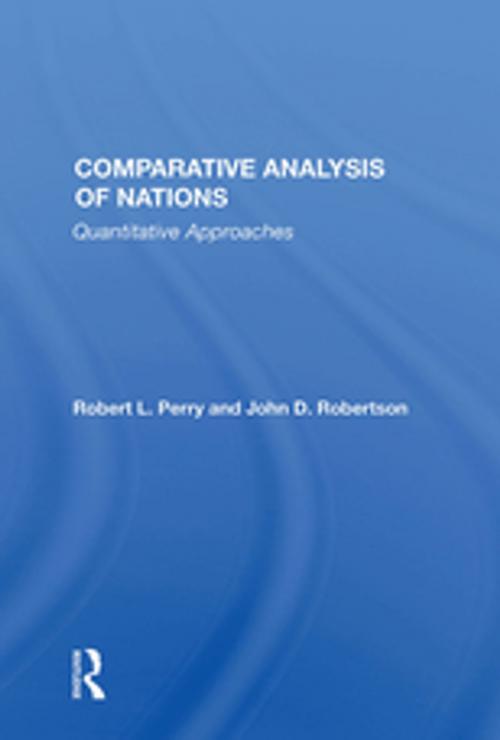Comparative Analysis Of Nations
Quantitative Approaches
Nonfiction, Social & Cultural Studies, Political Science| Author: | Robert Perry | ISBN: | 9780429716041 |
| Publisher: | Taylor and Francis | Publication: | March 1, 2019 |
| Imprint: | Routledge | Language: | English |
| Author: | Robert Perry |
| ISBN: | 9780429716041 |
| Publisher: | Taylor and Francis |
| Publication: | March 1, 2019 |
| Imprint: | Routledge |
| Language: | English |
The comparative method is fundamental and critical for political scientists, and especially those interested in comparative politics. Such questions as how democratic is the United States, how rich is Germany, and how ethnically complex is Nigeria-and what effects these attributes have on important political phenomena-cannot be analyzed except comparatively. To understand politics we need to think in terms of concepts, processes, behavior and authority patterns that transcend specific regions or nation-states. Comparative Analysis of Nations is designed to address three questions confronting the study of politics: (1) What do I do once I have identified a question that I want to explore within a cross-national perspective? (2) How do I proceed so I adequately address this question? (3) Why should I proceed with this particular study plan? Perry and Robertson examine how to conceptualize, operationalize, measure, sample, analyze, and evaluate these research questions. In clear language they stress the logic behind basic techniques of quantitative analysis, issues of measurement and hypothesis testing, basic techniques of hypothesis testing (tabular analysis, ANOVA, scatterplots, bivariate regression) and advanced bivariate analysis (curvilinear and multiple regression). The book requires no previous training in statistics or math. Cross-national data sets accompany the book on a CD-ROM and are compatible with the popular SPSS package. The data sets enable the instructor the opportunity to engage the students directly in devising their own modified models of analysis to complement and extend the demonstrations within the text. In sum, the text integrates the core tools and strategies of social science analysis within a framework that highlights the quantitative study of comparative politics.
The comparative method is fundamental and critical for political scientists, and especially those interested in comparative politics. Such questions as how democratic is the United States, how rich is Germany, and how ethnically complex is Nigeria-and what effects these attributes have on important political phenomena-cannot be analyzed except comparatively. To understand politics we need to think in terms of concepts, processes, behavior and authority patterns that transcend specific regions or nation-states. Comparative Analysis of Nations is designed to address three questions confronting the study of politics: (1) What do I do once I have identified a question that I want to explore within a cross-national perspective? (2) How do I proceed so I adequately address this question? (3) Why should I proceed with this particular study plan? Perry and Robertson examine how to conceptualize, operationalize, measure, sample, analyze, and evaluate these research questions. In clear language they stress the logic behind basic techniques of quantitative analysis, issues of measurement and hypothesis testing, basic techniques of hypothesis testing (tabular analysis, ANOVA, scatterplots, bivariate regression) and advanced bivariate analysis (curvilinear and multiple regression). The book requires no previous training in statistics or math. Cross-national data sets accompany the book on a CD-ROM and are compatible with the popular SPSS package. The data sets enable the instructor the opportunity to engage the students directly in devising their own modified models of analysis to complement and extend the demonstrations within the text. In sum, the text integrates the core tools and strategies of social science analysis within a framework that highlights the quantitative study of comparative politics.















